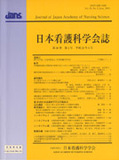Japanese
English
- 販売していません
- Abstract 文献概要
- 参考文献 Reference
- サイト内被引用 Cited by
要旨
目的:多剤耐性結核の治療のため隔離入院中の患者が病気をどのように受けとめ,どのようなことを感じながら入院生活を送っているかを明らかにする.
方法:入院中の多剤耐性結核患者5名に半構造化面接を実施し,質的記述的に分析した.
結果:病気について,全員が『治りにくい病気に罹った』と捉えた上で,『治るだろう』と受けとめている者,『治らないだろう』と考える者の両者が存在した.ほとんどの協力者が『先が見えない』と感じており,長期入院と隔離に大きなストレスを感じていた.入院生活について,全員が『楽しいことはほとんどない』と感じていた.『人に会えないのが寂しい』と閉塞感を訴え,『外とのやり取りで気が紛れる』と入院生活の辛さを紛らわせていた.『看護師との日常的な会話が楽しみ』と話す者もいた.
結論:看護師は日常的に患者と関わる中で患者と外との接点になり得るため,日常的なコミュニケーション場面での配慮が求められている.
Abstract
Objective:In Japan 100 new cases of multi-drug resistant tuberculosis (MDRTB) are diagnosed each year. During treatment patients must be hospitalized under isolation conditions. To describe their experience and feelings was the purpose of this study.
Method:Five patients in two hospitals responded to semi-structured interviews in 2006. Interviews were audio-taped, transcribed verbatim and analyzed by qualitative description.
Results:Participants were four men and a woman ranging in age from 45 to 76 years. Two were experiencing the initial onset of disease;the others were re-admissions. Their current admissions extended from 50 to 3036 days. All patients knew they had a disease that was “difficult to cure”; some believed they would “be cured,” but others were afraid that they “cannot be cured”; “whether they would survive to return home or not” was a concern. Most felt much stress because they “could not see future,” due to their disease and also the long-term hospitalization and isolation... “almost nothing about hospitalization is enjoyable.” Visits from family and friends, letters and emails, and conversations with nurses linked patients to others and the outside world.
Conclusion:MDRTB patients sense the possibility of death. As patients respond to laboratory tests and treatments nurses help them “envision their possible futures.” Nurses are key connectors to outside worlds. Recognition of and support for such communications functions might help nurses sustain their burden of caring and thus patients' endurance of the difficult conditions of their enforced hospitalization.
Copyright © 2010, Japan Academy of Nursing Science. All rights reserved.


